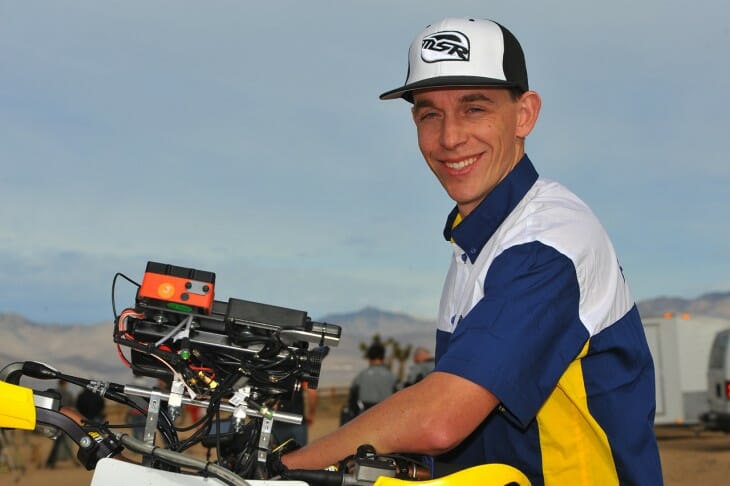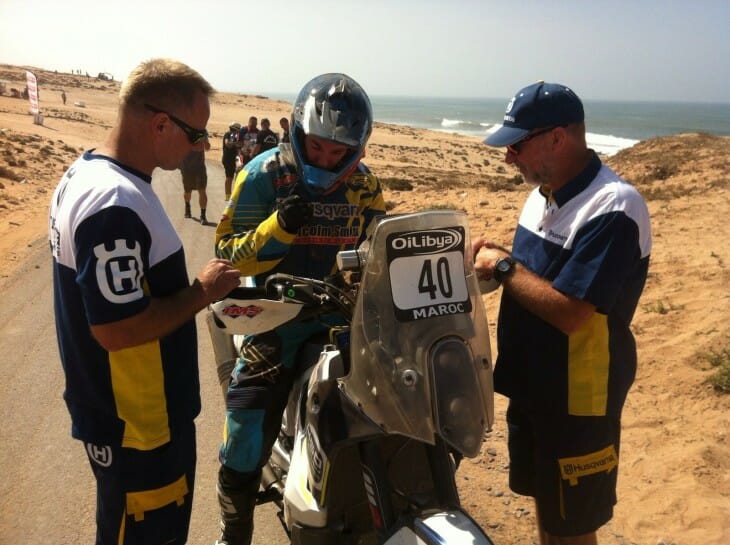Rennie Scaysbrook | December 20, 2015
 Alexander Smith’s not putting too much pressure on himself leading into Dakar 2016 but knows he has a chance to shine with the HT Rally Raid Husqvarna team.
Alexander Smith’s not putting too much pressure on himself leading into Dakar 2016 but knows he has a chance to shine with the HT Rally Raid Husqvarna team.
CN: This is your first year in the Dakar, who are you riding with and how did the association come about?
AS: Yes, it’s my first year doing Dakar and I’m riding for HT Rally Raid Husqvarna. They’re the official satellite team for Husqvarna. The ride came through Quinn Cody. He knows team manager Hank Hellegers and he introduced us and over the course of about five months, so we put together a program and HT helped out a bunch.
It must be pretty exciting doing your first Dakar.
Yeah. When I was 16 or so I had like a list of dream races that I wanted to ride. One was the Baja 1000 and there was a couple more, but Dakar was number one. Now it’s actually happening, it’s kind of surreal. When I was in Morocco in October the day before the Rally we went out with the team and did a photo shoot in the dunes. It was a surreal experience riding a factory rally bike in the dunes. It was wild.
What’s the difference between this style of riding and the races you’re used to?
I grew up racing enduro stuff, slow speed, technical riding. That’s really my competition background, plus extreme enduro and time keeping enduros. In 2013 I started racing the Baja 1000. I had ridden down there so much so I knew I could do well.
But rally is vastly different to what I’ve done before. The speed’s kind of the same as Baja but the level of confidence is a lot different. On a rally bike you’re never 100 percent confident you’re on the right track until you see the checkered flag. But in Baja you just glance at your GPS right you know you’re on the right track.
What’s some of the nuances of running with a road book?
The main difference for me is that there’s no confirmation that you’re where you’re supposed to be. I think that’s the hardest part for me is there’s never that moment where I can just glance down and know this is where I’m supposed to be and I’m going to pin it for the next five miles.
You think you’re right and everything on the road book looks right. The odometer’s reading correct, but nothing tells you your point like a GPS does. So I think that’s the hardest thing for somebody that hasn’t done it to get over is build that level of confidence in reading your road book. It’s also like trying to read a magazine and ride your motorcycle at the same time. You’re trying to read the road book, trying to match the road book to what you’re seeing in front of you, match it with your odometer, match it with your cap heading (digital compass), and do it at once and still ride without mistakes.
Why doesn’t the Dakar GPS?
I think it’s just one of those things that they don’t want to go to. I think they want to keep it old school. Rally racing is a big deal in Europe and I think they want to stay true to that.
 The Moroccan Rally was a tough one for Smith but by the end of the event he was starting to gain speed and confidence. Credit: https://www.facebook.com/HTrallyraid/
The Moroccan Rally was a tough one for Smith but by the end of the event he was starting to gain speed and confidence. Credit: https://www.facebook.com/HTrallyraid/
How was the Moroccan Rally?
That was a learning experience. It was tough, getting used to the format, getting used to the bike. The first two days I was really questioning why I was there, what I was doing riding a motorcycle. It was that moment where I was thinking maybe I shouldn’t ride motorcycles anymore because this is going really bad. So I’m glad I had those feeling in Morocco rather than when I get to Dakar. By the end of Morocco on the fifth day I was feeling confident, felt like I could go fast on the bike. I didn’t feel like everything was foreign to me, so that was good.
One of the cool things about racing Rally is you get to see some pretty gnarly areas of the world. What was riding through Morocco like?
Morocco was pretty wild. I’ve been to a lot of third world countries in my life and Morocco was definitely a different experience for me. Northern Africa, I figured, would be pretty different but nothing really prepared me for the level of poverty there. It’s a gnarly place.
You’re on a carbon-fiber motorcycle riding through Bedouin camps where they live in tents in the sand dunes. It was a culture shock for sure and I feel like I’m pretty well traveled, so for me to have a culture shock was a big deal.
Have you had much rally practice apart from the Moroccan Rally?
I’ve done I think four or five big road book rides, prepping for road book racing. I’ve been doing that with Quinn (Cody), and been doing that on my own. I’ve just basically mounted up a road book to my desert bike and been doing as much mileage as I can.
Looking towards the Dakar, what are your expectations?
My expectations are just not have any major issues. The bike is really solid. If anything happens it won’t be the bike’s fault. So I just need no mistakes on my part, no crashes, no downtime and to just keep moving the entire rally and hopefully we’ll be in a respectable position – if that’s top 30 or something like that then I’d be more than happy with that.
What are your racing plans for next year? Aside from Dakar, is anything else in the pipeline?
Racing-wise, no. I’m getting married next year and I’ll just focus on running the motorcycle shop, Malcolm Smith Motorsports in Riverside. It’s a big ship, we’ve got 65 employees. So trying to race and run that show is challenging. So next year it’s going to be focus on work and my personal life. I’ll ride as much as I can but I don’t think we’ll do any big races.